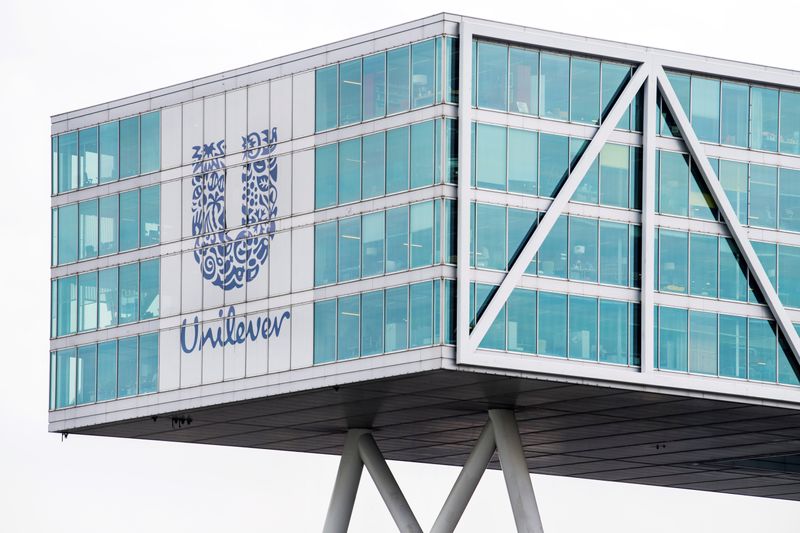By Siddharth Cavale
(Reuters) - Second-quarter sales at Unilever (L:ULVR) (AS:UNA) fell much less than expected as a pick up in eating at home during coronavirus lockdowns boosted demand for products such as Hellmann's mayonnaise and Breyers ice cream.
Shares in the consumer goods giant rose as much as 8.7% in early Thursday trading, as the Anglo-Dutch group surprised analysts who had expected a much bigger hit to sales from the closure of restaurants, schools, cinemas and outside venues.
"Overall, Unilever's strong performance in the period and an increasingly focused strategy has led to a sigh of overdue relief from investors," said Richard Hunter, head of markets at interactive investors.
Underlying sales fell 0.3% in the three months ended June 30, compared with analysts' mean forecast for a 4.3% drop.
That was still the first decline in quarterly sales since the third quarter of 2004, according to Jefferies (NYSE:JEF) analysts.
Underlying sales in North America jumped 7.3% in the first half, with volumes up as much as 20% in some categories, Chief Financial Officer Graeme Pitkethly told a media call. The United States is Unilever's biggest market by revenue.
Breyers, Magnum and Klondike ice-cream, along with Hellmann's mayonnaise and Knorr soups, were strong performers in food, while Suave beauty products did well in hygiene, he said.
"We see no signs of North America slowing down," Chief Executive Officer Alan Jope told analysts, despite coronavirus-cases spiking in the United States.
Other virus hot-spots were more of a concern, however.
"Things are starting to get into the toughest phase in Latin America and Africa," Pitkethly said, adding a surge in gang-related violence in Mexico was making business difficult there.
Highlighting the huge disruptions caused by the pandemic, Unilever said food service sales declined by nearly 40% and out-of-home ice cream by nearly 30% in the first half. However, e-commerce sales were up 49%, with North America leaping 177%.
Pitkethly said the firm's food solutions business, which caters to canteens, schools and cafeterias and makes about 5% of group sales, was starting to recover as lockdowns are lifted.
While sales were down 70% in March, the decline has eased to 38%, with the improvement accelerating, he said.
TEA REVIEW
Unilever also said that after exploring options for its 3 billion euros ($3.5 billion) a year tea business, it had decided to keep its operations in India and Indonesia and its ready-to-drink joint venture with PepsiCo (O:PEP).
The rest of the tea business, which sells Pukka Herb and PG Tips and made 2 billion euros of revenues in 2019, will be separated into an independent entity, a process the company expects to conclude by the end of 2021.
Some analysts think Unilever could ultimately be more exposed to the pandemic than rivals such as Procter & Gamble (N:PG) and Nestle (S:NESN) due to its greater reliance on emerging markets, where it makes about 60% of annual sales.
Graphic: Unilever shares versus peers - https://fingfx.thomsonreuters.com/gfx/mkt/nmopalnayva/Unilever%20shares%20vs%20peers.PNG
Analysts expect Nestle to report flat quarterly sales next week. Its shares were up more than 1% after Unilever's forecast-beating performance, but Jefferies analyst Martin Deboo cautioned against reading too much into Unilever's results for Nestle.
In North America, for example, he noted that while Unilever had benefited from its strength in foods, Nestle was more exposed to pet care, where there are signs consumers are running down stocks after building them up in March.
Unilever's underlying sales in developed markets rose 2.4% in the first half, while they declined 1.9% in emerging markets.
In China - where the virus first emerged and was first brought under control - sales returned to mid-single digit growth in the second quarter, although food service remained challenging, the company said.

Graphic: Unilever's emerging markets dependence grows - https://fingfx.thomsonreuters.com/gfx/mkt/yxmpjrkegpr/Pasted%20image%201595499769498.png